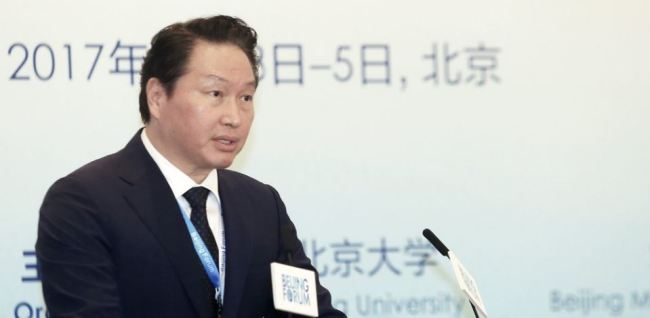The sharing economy can simply refer to well-known platforms like Uber and Airbnb, or in the broader sense of all democratized marketplaces. Unlike its vibrant use in North America, though, the term remains relatively unfamiliar to the public here. Now a Korean chaebol is seeking to bring this economic concept to life in the South Korean market.
Chey Tae-won, the chairman of telecom and energy giant SK Group and the nation‘s fifth-richest man, according to The Investor, has been pursuing ways to promote the sharing economy nationwide, facilitating tangible and intangible assets held by his companies.
 |
Chey Tae-won (Yonhap) |
Taking a big step forward, SK Innovation, the conglomerate’s energy arm, said last week it would provide 3,600 gas stations across the country as a platform of the sharing economy.
It plans to start receiving innovative business ideas from applicants by providing access to the company’s infrastructure. SK’s assets to be shared with the general public here include everything from pumps and washers at gas stations to marketing know-how held by the energy distributor.
Titled “Gas Station Sangsang (Imagination) Project,” the company will select eight business models and eight ideas from applicants through the end of January.
For idea contest winners, SK Innovation will provide opportunities for joint ventures with the firm. Students with creative ideas will also get extra points when applying for a job at the company, officials said.
“Such a measure involving shared infrastructure is a result of months of preparation after Chairman Chey proposed growth by simultaneously fostering economic and social values,” according to the company.
Connecting benefits for both owner and renter is at the center of Chey’s management vision on seeking deep change, the company explained.
“When ideas from the people are applied to tangible and intangible assets by the nation’s largest gas station (business), we could expect to have great ripple effects,” the company added.
The sharing economy, suggested by Harvard law professor Lawrence Lessig in 2007, is also known as a collaborative economy based on peer-to-peer activity of acquiring and sharing access to goods and services facilitated by an online platform.
Not only SK Innovation, but also other major business units including telecom and chips businesses are looking to emulate the concept. A task force to drive the project was launched in July.
The move differs from other community outreach programs, officials said, as Chey appears to be of the thinking that the concept will create new business opportunities.
“I think he was inspired from (entrepreneurs and innovative thinkers) from the Davos forum (that he has been attending for years),” said Park Ju-gun, CEO of a local corporate tracker CEOScore.
“After all, the idea is to have SK’s business sustainable, as the purpose of the Swiss forum is about how to sustain business growth. And it perhaps is his own business color (or within his wheelhouse),” he said.
Chey is a second-generation chaebol scion who became chief of the telecom-to-energy conglomerate at the age of 38.
After graduating from the University of Chicago with a major in economics, Chey eventually took control of the empire valued at 160 trillion won ($148 billion), while the top decision-making Supex council, comprising chief executives of 16 companies, has deliberately decided on groupwide issues. The firms are autonomously run by their respective managers.
By Cho Chung-un (
christory@heraldcorp.com)








